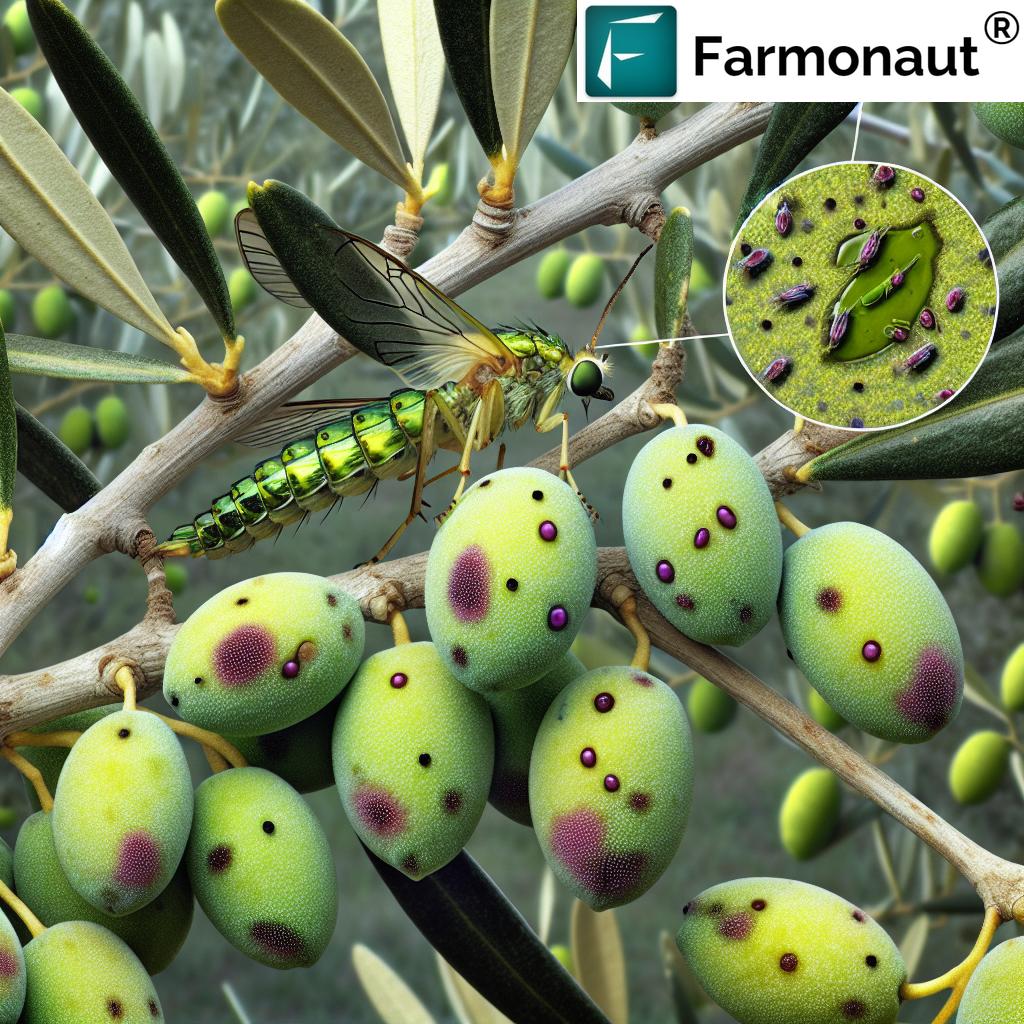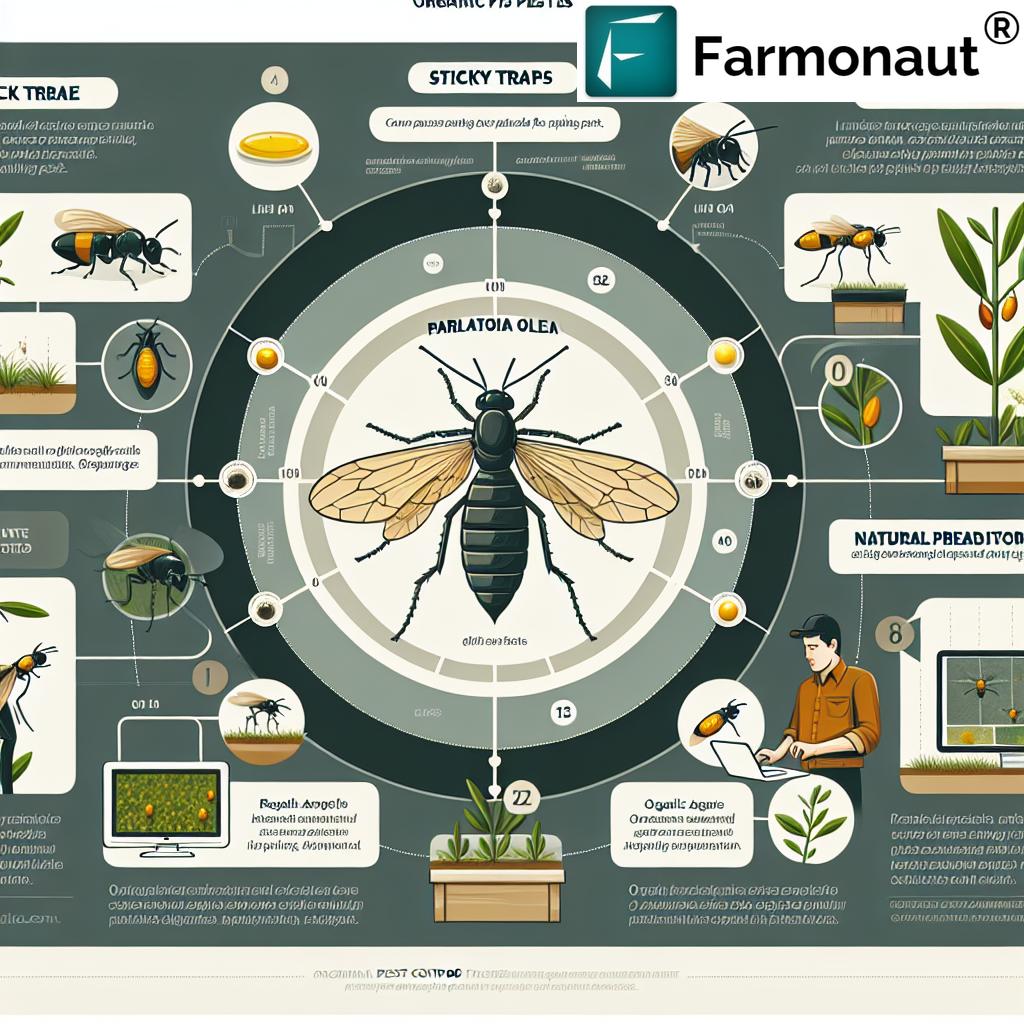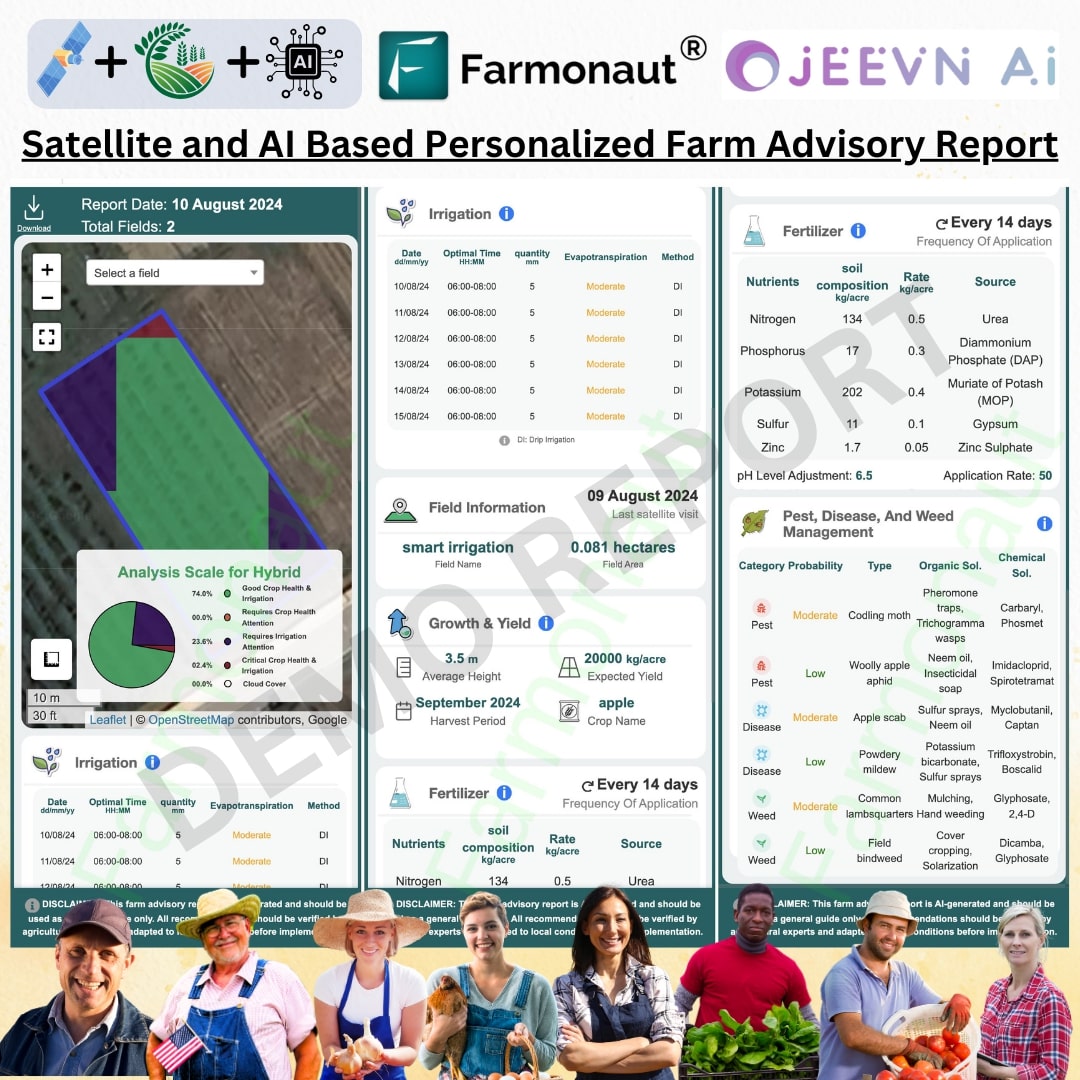Organic Pest Control for Olives: Effective Strategies to Combat Parlatoria Oleae and Protect Your Fruit

As olive growers, we understand the importance of protecting our precious fruit from pests and diseases. One of the most challenging insects that olive farmers face is Parlatoria oleae, commonly known as the olive scale. This persistent pest can cause significant damage to olive trees and fruits if left unchecked. In this comprehensive guide, we’ll explore effective organic pest control strategies to combat Parlatoria oleae and other common olive pests, ensuring a healthy and bountiful harvest.
Understanding Parlatoria Oleae: The Olive Scale Menace
Before we dive into control methods, it’s crucial to understand the lifecycle and behavior of Parlatoria oleae:
- Appearance: Adult females are small, dark purple to black, and circular in shape.
- Lifecycle: Females lay eggs beneath their protective covering. These eggs emerge as crawlers, which then settle on the tree to feed.
- Damage: As they feed, they extract sap from leaves, twigs, and fruits, causing yellowing, defoliation, and purple spots on infested fruits.
The Impact of Parlatoria Oleae on Olive Production
Parlatoria oleae can have devastating effects on olive groves:
- Reduced photosynthesis due to leaf damage
- Weakened tree health and vigor
- Decreased fruit quality and yield
- Potential rejection of infested fruits in the market
Organic Pest Control Strategies for Olive Groves
At Farmonaut, we advocate for sustainable and organic farming practices. Here are some effective organic methods to control Parlatoria oleae and other olive pests:
1. Cultural Control Methods
- Pruning: Regular pruning improves air circulation and sunlight penetration, creating an environment less favorable for scale insects.
- Sanitation: Remove and destroy heavily infested branches to prevent the spread of the pest.
- Irrigation Management: Avoid over-watering, as excess moisture can create conditions conducive to pest proliferation.
2. Biological Control: Harnessing Natural Enemies
Encouraging natural enemies of Parlatoria oleae is an effective and environmentally friendly approach:
- Parasitic Wasps: Species like Aphytis maculicornis are beneficial parasitoids that can help control scale populations.
- Predatory Beetles: Ladybirds and other predatory beetles feed on scale insects, providing natural pest control.
- Creating Habitat: Plant diverse flowering plants near your olive grove to attract and sustain these beneficial insects.
3. Organic Insecticides and Treatments
When cultural and biological controls aren’t sufficient, organic insecticides can be used as part of an integrated pest management strategy:
- Horticultural Oils: These oils suffocate scale insects and are particularly effective against overwintering stages.
- Neem Oil: A natural insecticide that disrupts the feeding and growth of many pests, including scales.
- Insecticidal Soaps: These organic products can be effective against soft-bodied insects like scale crawlers.
4. Monitoring and Early Detection
Regular monitoring is crucial for effective pest management. Here’s where Farmonaut’s satellite-based crop monitoring system can be a game-changer:
- Satellite Imagery: Our advanced satellite technology allows for early detection of pest infestations across large areas.
- NDVI Analysis: Vegetation health indices can indicate stress caused by pest activity before it’s visible to the naked eye.
- Targeted Inspections: Use our satellite data to guide ground-level inspections, focusing on areas showing potential infestation signs.
Learn more about our satellite monitoring system: Farmonaut Crop Monitoring
Comparing Traditional Pest Monitoring with Farmonaut’s Satellite System
| Feature | Traditional Pest Monitoring | Farmonaut Satellite System |
|---|---|---|
| Detection Speed | Slow, relies on visual inspections | Rapid, can detect early signs of stress |
| Accuracy | Variable, depends on inspector’s skill | High, uses advanced algorithms and multispectral imagery |
| Coverage Area | Limited, time-consuming for large groves | Extensive, can monitor entire groves at once |
| Cost-effectiveness | Labor-intensive and expensive for large areas | Highly cost-effective, especially for large-scale operations |
Implementing an Integrated Pest Management (IPM) Approach
An effective IPM strategy combines various control methods to manage Parlatoria oleae and other olive pests:
- Regular Monitoring: Use Farmonaut’s satellite monitoring system for early detection.
- Cultural Practices: Implement proper pruning, irrigation, and sanitation.
- Biological Control: Encourage and introduce natural enemies.
- Organic Treatments: Apply organic insecticides when necessary, targeting the crawler stage for maximum effectiveness.
- Record Keeping: Maintain detailed records of pest populations, treatments, and their effectiveness.
The Role of Technology in Modern Olive Pest Management

At Farmonaut, we’re at the forefront of integrating technology into agricultural practices. Our satellite-based monitoring system offers several advantages for olive growers:
- Early Warning System: Detect pest infestations before they become severe.
- Precision Targeting: Apply treatments only where needed, reducing costs and environmental impact.
- Data-Driven Decisions: Make informed choices based on real-time and historical data.
- Large-Scale Monitoring: Efficiently manage vast olive groves with ease.
Explore our API for custom integration: Farmonaut API
Case Study: Successful Organic Pest Control in Mediterranean Olive Groves
While we don’t have specific case studies to share, many olive growers across the Mediterranean have successfully implemented organic pest control methods. These growers have reported:
- Significant reduction in Parlatoria oleae populations
- Improved fruit quality and yield
- Enhanced biodiversity in their groves
- Reduced reliance on chemical insecticides
Preventive Measures for Long-Term Pest Control
Prevention is key to maintaining a healthy olive grove. Consider these long-term strategies:
- Resistant Varieties: Choose olive varieties that show natural resistance to Parlatoria oleae.
- Companion Planting: Introduce plants that repel pests or attract beneficial insects.
- Soil Health: Maintain healthy soil through organic practices to promote strong, resilient trees.
- Regular Assessments: Conduct routine health checks using Farmonaut’s satellite monitoring system.
Organic Treatments for Severe Infestations
In cases of severe Parlatoria oleae infestations, more intensive organic treatments may be necessary:
- Sticky Barriers: Apply sticky bands around tree trunks to prevent crawlers from ascending.
- Kaolin Clay: This fine powder creates a protective barrier on tree surfaces, deterring scale insects.
- Diatomaceous Earth: This natural substance can be effective against crawlers when applied to tree bark.
The Importance of Timing in Pest Control
Timing is crucial when managing Parlatoria oleae. Here’s why:
- Crawler Stage: This is the most vulnerable stage for treatment.
- Seasonal Variations: Pest activity varies with seasons, affecting treatment efficacy.
- Tree Growth Stages: Certain treatments may be more effective or safer at different growth stages.
Farmonaut’s weather API can help you time your treatments perfectly: Farmonaut Weather API
Balancing Pest Control and Beneficial Insect Protection
While controlling Parlatoria oleae, it’s crucial to protect beneficial insects:
- Use selective treatments that target specific pests.
- Apply treatments during times when beneficial insects are less active.
- Create insect “refuges” in and around your olive grove.
- Monitor beneficial insect populations alongside pest populations.
The Future of Olive Pest Management
Looking ahead, we see several exciting developments in olive pest management:
- Advanced AI for pest prediction and management
- Drone technology for precise treatment application
- Development of new, environmentally friendly organic pesticides
- Improved understanding of plant-pest interactions for better control strategies
FAQs About Organic Pest Control for Olives
- Q: How often should I monitor my olive grove for Parlatoria oleae?
A: Regular monitoring is crucial. With Farmonaut’s satellite system, you can receive weekly updates on your grove’s health. For ground-level inspections, we recommend checking at least bi-weekly during peak seasons. - Q: Are organic insecticides as effective as chemical ones?
A: When used correctly, organic insecticides can be highly effective. They may require more frequent application but offer the benefit of being environmentally friendly and safe for beneficial insects. - Q: How can I attract natural enemies of Parlatoria oleae to my olive grove?
A: Plant diverse flowering plants near your grove, provide water sources, and avoid broad-spectrum pesticides. Creating a diverse ecosystem will naturally attract and sustain beneficial insects. - Q: Can Parlatoria oleae develop resistance to organic treatments?
A: While resistance is less common with organic treatments, it’s still possible. Rotating different control methods and maintaining an integrated pest management approach helps prevent resistance development. - Q: How does Farmonaut’s satellite monitoring detect pest infestations?
A: Our system uses multispectral imagery to detect changes in vegetation health. Early signs of pest damage often appear as changes in leaf color or canopy density, which our algorithms can detect before they’re visible to the naked eye.
Conclusion: Embracing Organic Pest Control for Healthier Olive Groves
Organic pest control for olives, particularly against Parlatoria oleae, is not just about protecting your harvest—it’s about nurturing a sustainable and healthy ecosystem. By combining traditional wisdom with modern technology like Farmonaut’s satellite monitoring system, we can effectively manage pests while preserving the delicate balance of nature in our olive groves.
Remember, successful pest management is an ongoing process that requires vigilance, adaptability, and a commitment to sustainable practices. With the right tools and knowledge, we can ensure that our olive groves thrive for generations to come.
For more information on how Farmonaut can help you manage your olive grove more effectively, visit our website or download our app:
Ready to take your olive grove management to the next level? Subscribe to Farmonaut today:
Together, we can cultivate healthier, more productive olive groves while preserving our environment for future generations.

